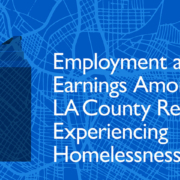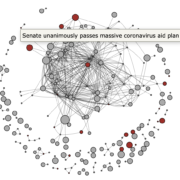UCLA California Policy Lab Releases Report on the Impact of COVID-19 on California’s Labor Market
 New Analysis of Unemployment Insurance Claims in California Provides Detailed Snapshot of How COVID-19 is Impacting California Workers, Industries, and Counties
New Analysis of Unemployment Insurance Claims in California Provides Detailed Snapshot of How COVID-19 is Impacting California Workers, Industries, and Counties
April 29th, 2020
A new analysis of initial Unemployment Insurance (UI) claims by the California Policy Lab at UCLA and the Labor Market Information Division at the California Employment Development Department provides an in-depth and near real-time look at how the COVID-19 crisis is impacting various types of workers, industries and regions throughout California. The policy brief “An Analysis of Unemployment Insurance Claims in California During the COVID-19 Pandemic” was released today.
“It’s clear that California workers who are the least able to afford it are being the most impacted by COVID-19,” explains Till von Wachter, a co-author of the analysis, UCLA economics professor and faculty director at the California Policy Lab. “While the rise in initial UI claims and their potential implications for unemployment are alarming, we also see some positive signs: besides a slight leveling off of new claims in the most recent two weeks in April, we see a much higher percent of people claiming UI benefits are reporting that they expect to return to their former employers. Given these findings, policymakers should consider how best to support employers to stay afloat and rehire their employees, and how to target relief to the groups of workers who have been most severely impacted.”
Key research findings:
- 90% of Californians who filed initial UI claims in the first two weeks of April reported that they expected to be recalled to their prior jobs, a substantial increase from the 40% of claimants who reported this before the crisis.
- Younger, lower-wage, and lower-educated workers and women have been disproportionately impacted by unemployment in response to the COVID-19 crisis. Since the start of the Covid-19 crisis in the labor market (in mid-March), among those in the labor force, 1 in 3 high school graduates, 1 in 4 aged 20-23, and 1 in 6 women filed initial UI claims.
- Since mid-March 14.4% of the California labor force has filed initial UI claims. If none of these initial UI claimants have returned to work, this implies a rise in the unemployment rate to close to 20% from the 5.3% prevailing in mid-March.
- Almost 1 in 3 workers in Food and Accommodations and 1 in 5 workers in Retail Sales filed new initial claims. Several other large sectors experienced substantial increases in initial UI claims since mid-March, including Health Care and Social Services; Manufacturing; Construction; Other Services; and Administrative Support, Waste Management, and Remediation.
- All counties in California have experienced substantial growth in initial UI claims, but the rise has been more pronounced in several of the usually economically strong areas of the state, including the San Francisco Bay Area, Los Angeles, and Southern California.
This analysis will be updated on a weekly basis with new data on initial Unemployment Insurance claims to provide a timely and detailed analysis of the impacts of COVID-19 on California’s labor market.
Methodology
The analysis is based on comparing initial unemployment insurance claims in February 2020 (before the COVID-19 crisis impacted the labor markets); the start of the employment crisis in mid-March (when initial UI claims increased dramatically); and more recently the first 11 days of April.
The analysis complements traditional survey-based indicators on the labor market, which have detailed information but large time lags and which are released not as frequently, and to weekly publications of the number of total UI claims, which have minimal time lags but which lack the detail available in this analysis.
Download the full report HERE.
Contact:
Sean Coffey: sean@capolicylab.org
(919) 428-1143
The California Policy Lab creates data-driven insights for the public good. Our mission is to partner with California’s state and local governments to generate scientific evidence that solves California’s most urgent problems, including homelessness, poverty, crime, and education inequality. We facilitate close working partnerships between policymakers and researchers at the University of California to help evaluate and improve public programs through empirical research and technical assistance.
The Labor Market Information Division (LMID) is the official source for California Labor Market Information. The LMID promotes California’s economic health by providing information to help people understand California’s economy and make informed labor market choices. We collect, analyze, and publish statistical data and reports on California’s labor force, industries, occupations, employment projections, wages and other important labor market and economic data.









